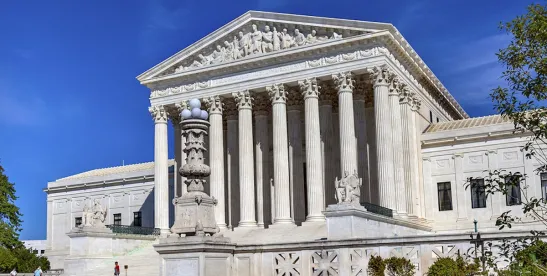On April 4, 2025, the United States Supreme Court granted an emergency application to vacate the First Circuit Court of Appeals’ March 10 temporary restraining order (TRO) in the case of Department of Education v. California. The TRO had previously required the federal government to reinstate approximately $65 million in grants earmarked for recruiting and training teachers, which were previously terminated due to certain diversity, equity and inclusion (DEI) training and initiatives included in the grants. The Supreme Court's decision allows the Department of Education to withhold and halt funding for these grants, prompting significant implications for organizations that rely on these grants. While the opinion is limited only to several grants for teacher recruitment and training, it opens the door for government agencies to immediately freeze or terminate grant funding and gives grant recipients little or no recourse to access potentially critical funding until lengthy and expensive litigation is complete.
The Court's 5-4 majority opinion stated that the government would be unable to claw back funds without immediate intervention and funds may be withheld until litigation is completed. The Court’s opinion effectively stays the TRO and allows the Department of Education to proceed with its plan to terminate grants under the Teacher Quality Partnership (TQP) and Supporting Effective Educator Development (SEED) programs while the matter is litigated.
Although temporary restraining orders are typically not appealable, the Court majority believed that appellate review was justified because the TRO more closely resembled a preliminary injunction, which is appealable. The Court also noted that the government was likely to succeed in showing that the District Court did not have the authority to order payments of money under the Administrative Procedure Act, which does not typically cover monetary claims. Additionally, the Court majority believed that the state respondents would not suffer irreparable harm while the TRO was stayed because they had the financial means to continue the programs and could recover any wrongly withheld funds through appropriate legal channels. In dissent, several justices criticized the majority decision because the Department of Education's grant funding terminations contradicted clear congressional goals in disbursing grant funding to educational institutions and other objectives.
With this opinion, organizations will need to carefully weigh whether to pursue injunctive relief based on the scope and size of the grant versus the time, cost and likelihood of success associated with litigation. For smaller grants and/or smaller organizations, this opinion may limit the ability or desire to challenge an adverse agency action related to a grant.
This opinion also raises important questions about whether a court has the authority to require grant payments in an injunction. It opens the floodgates for other cases to be brought by the new administration, including previous attempts to cut Federal assistance funding and foreign aid. As tensions between federal courts and the executive branch over funding decisions rise, time will tell what role the judicial branch will have in shaping or impacting this Administration's policies.








 />i
/>i

